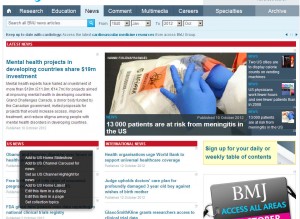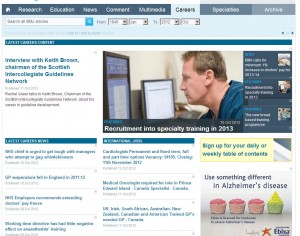Geo-targeted content: country tagging on bmj.com
12 Oct, 12 | by BMJ
Eighteen months ago a colleague and I were looking at the online and print BMJ with a view to discovering the ratio of UK to international content. At the time planned changes to both the NHS in England and the US healthcare system were generating a lot of news, comment, and debate.
Colleagues were spending increasing amounts of time in the US, India, and elsewhere, attending conferences and participating in workshops, yielding in rise in article submissions from these countries. This was helped in part by the decision to recruit a European research editor, based in the Netherlands, to complement a similar post based in the US. We also have an education editor based in Sydney.
All of these developments had resulted in our multimedia content (audio and video) having an increasingly international focus, with interviewees as likely to come from New York or Stockholm as they were from the UK.
The BMJ’s international credentials pre-date the arrival of the internet and the journal’s first online appearance in 1995. Perhaps the earliest example is Ernest Hart campaigning for the Indian government to do more to prevent cholera following his appointment as editor in 1866. More recently, many of our recent investigations (sports drinks, metal on metal hip implants etc) have attracted lots of online traffic from outside the UK.
After the bmj.com redesign and migration to Drupal went live in November 2011, we started thinking about how best to geo-target our content. Many news websites (FT, CNN, BBC) have local and international editions, using IP addresses to determine which version gets served. Mostly these are homepage-only offerings. We decided to go further and include our research, news, comment, and education channels.
Our US web window launched first. The editorial process starts when an article is tagged according to its relevance to US physicians. So, for example, a news story about Presidential candidate Mitt Romney’s healthcare plans gets tagged as US, so it shows in the US news feed on the news channel.
Alongside the US news feed is an international news feed. This pulls in articles about healthcare developments in the rest of the world, including the UK. However, many of our UK news stories are about the NHS or British Medical Assocication, and so of limited interest to readers from abroad. These stories get tagged as “local,” which means they only show in the UK.
Our UK window launched this week. We have others planned. Some channels (research and education in particular) contain content which is more international. Here the opportunity to geo-target is mainly confined to the picture slideshow of headlines and the one-paragraph slot alongside. But when we get more research, education and scholarly comment from the US and other countries, which is certainly our ambition, we will develop these channels further.
The slideshow elements and homepage are assembled by the BMJ web team. The team also has the ability to re-tag or remove content from the automated content feeds if we feel they might sit better elsewhere. The image shows the admin interface that appears when we want to allocate a story more prominence on a homepage or channel page, or remove it from a specific content feed.
One final development is the launch of a new careers channel on bmj.com. It pulls in news and features from BMJ Careers, alongside UK and international jobs, which are prioritised according to which part of the world a visitor comes from. A UK visitor, for example, will see UK jobs showing above international ones.
The sky is potentially the limit with our country portals, but the important thing is that they are driven by content. We’ve increased our editorial presence in the US to include a New York-based news and features editor. We’ve also recruited a second research editor, based on the east coast. Success for us will mean higher traffic from these countries and more articles, including user-generated content such as blogs and article responses.
We are at the begining of an important learning process and welcome feedback.
David Payne is editor bmj.com

